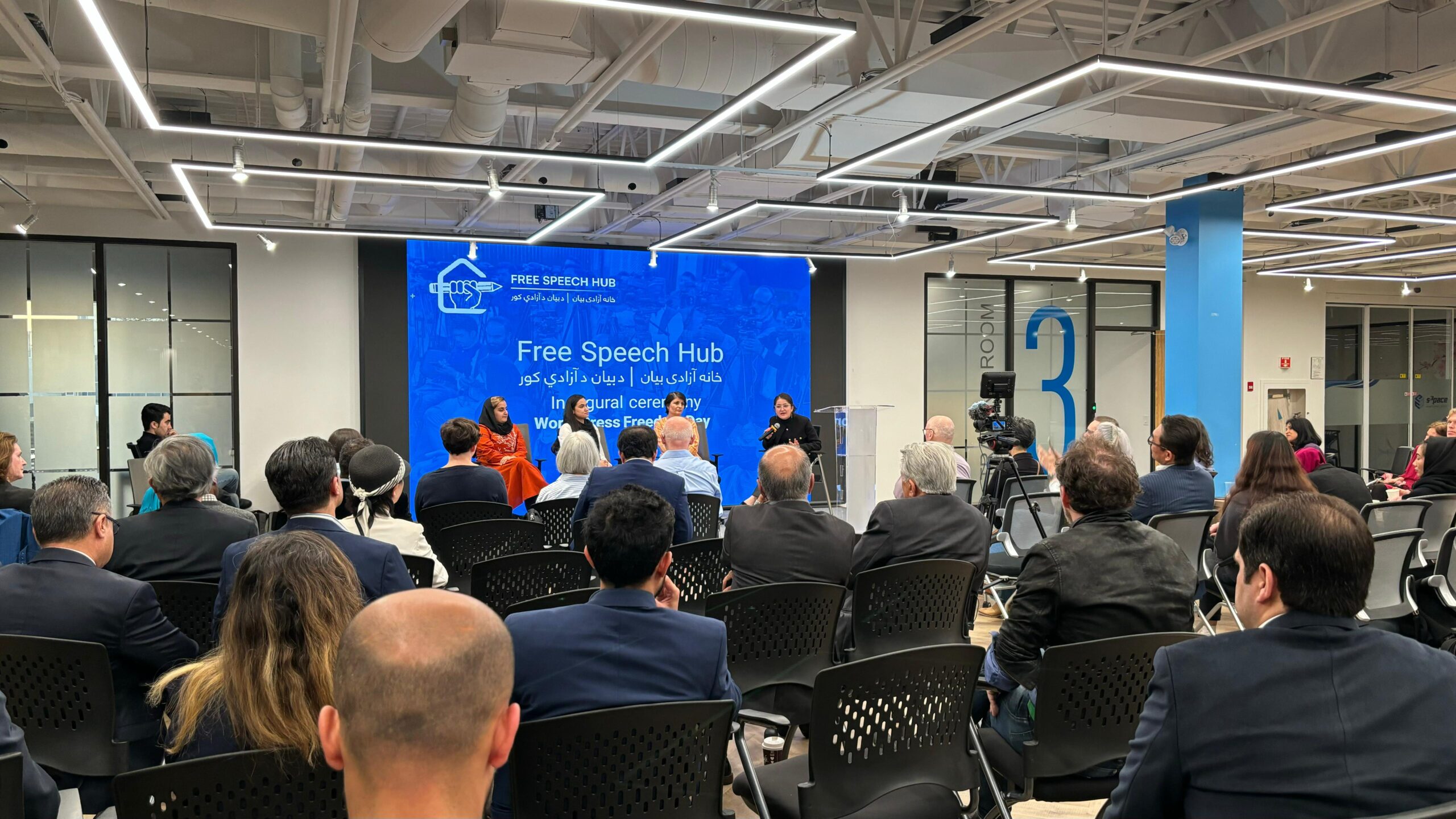Rukhshana Ahmadi, a Hazara writer from Afghanistan, was born and raised in Jaghori, the southern fringes of the Hazaristan region. Back home, she studied English Literature and Civil Aviation. Following the Taliban's takeover in August 2021, she fled to Canada. Her passion for storytelling led her to pursue a career in News, and she is currently in her third year of a journalism program at TMU. In her second year, Ahmadi received the Len Coates Memorial Award from the journalism faculty for being the most promising student in her class. She is a creative writer for The Archipelago and was awarded the MAX scholarship among 600 applicants. In 2023, she also received The Vittoria Adhami Immigrant Women’s Scholarship. Ahmadi is dedicated to a career in international journalism and news anchoring - she thrives on uncovering human interest stories and shedding light on social justice issues. Words are the essence of Ahmadi’s existence. She finds greatest joy when documenting life through writing, photography, video, and the art of poetry.
Since August 2021, I can hardly close my eyes at night. I often suffer from debilitating migraines. At night when I manage to fall asleep, my dreams are filled with roadside bombs or men with guns. Some nights, or most nights if I’m honest, memories of my last hours in Afghanistan play over and over in a loop: the panicked crowds outside Kabul airport, people being whipped and beaten, the sounds of gunshots, the little baby crying on the ground, the bomb blast that separated me from my mother and my entire family.
When I wake up in my small apartment in Toronto, where I have been living as a refugee since escaping from the Taliban in August 2021, Afghan women are the first thing I think of. When I watch my 15-year-old sister head off to school, a whirlwind of emotions consumes my thoughts. I am plagued with countless questions running through my mind. Why should a little girl be banned from getting an education? Why, across the world, is there a woman just like me with the same abilities, the same desires, the same work ethic and love for her family, who would most likely write better stories and deliver better speeches than me, only she has to sit at home and her voice has been silenced?
The woman in my thoughts worries about what her children will eat, how to keep them safe and if they’ll ever be allowed to do what they want. I don’t know why this is my life and that’s hers.
In the last two and a half years I have faced so many hardships and obstacles — too many to recount — but I was fortunate about one thing: I had the chance to continue my education. In 2022, I enrolled in the journalism program at Toronto Metropolitan University motivated by a desire to tell the stories of my own people.
Back home, I was studying English literature and civil aviation at two different universities. I was in my third year when Kabul fell to the Taliban. Suddenly, I was barred from all public activities and my existence was symbolized by a long black scarf that I was obligated to wrap myself in completely. I had no option but to flee.
As I left Afghanistan in August 2021, alone, my hope rested first on my friends, cousins and all my fellow sisters who are tirelessly fighting for their rights: education, participation in society, employment and the freedom to be themselves. My second hope was the journalists. I knew journalists would reveal the true face of the Taliban to the world. Many risked their lives by staying, while others fled the country, scattering across the globe. Some were able to rebuild their lives, but others perished on treacherous journeys or from lack of access to health care. It seemed as though, overnight, the Taliban had torn our country apart, leaving a trail of devastation in their wake.
At just 22 years old, coming to Canada alone was a difficult decision, but I knew it was the only option I had. Leaving everything behind was daunting. Boarding that evacuation flight, I had little hope for my future, but now I can say I am grateful for the opportunities that have opened up for me here and feel proud of the progress I’ve made. My immediate family was able to join me in Toronto five months ago, and that has given me a renewed sense of strength.
I’ve also found hope in the form of a community of journalists who want the same thing as me: to help journalism survive in Afghanistan.
On May 1, I attended the inaugural ceremony of Free Speech Hub, a non-profit organization supporting Afghan journalists living in exile. The group was founded by Said Najib Asil, a journalism graduate from Kabul University and former head of current affairs at the Afghan TOLONews. For one night, it was thrilling to see dozens of Afghan journalists gathered in the same space in downtown Toronto trading stories and business cards with dozens of journalists from across Canada who were there to support the FSH. Journalists from various media outlets including the CBC, CTV and the Walrus were there, joined by representatives from Journalists for Human Rights, the Canadian Association of Journalists and Pen Canada.
The ceremony began with a captivating visual presentation showcasing the beauty of Afghanistan, highlighting its rich culture, language and history. It was followed by insightful reports on the dire situation that Afghan journalists currently face and inspiring guest speakers who shared stories of resilience.
Since the Taliban takeover of Afghanistan in 2021, nearly 600 media outlets have been forced to close, leaving the remaining few struggling to stay afloat. Close to 80 per cent of all women journalists have lost their jobs and are not allowed to work outside of their homes, according to Reporters Without Borders. Overall, the number of women media professionals has plummeted from 1,190 to less than 240 in the wake of the Taliban’s control.
A report by FSH and 8AM Media, an Afghan newspaper, revealed that 130 media personnel have been killed by the Taliban in attacks including suicide bombings, armed assaults and mine explosions. At least 13 women journalists have been victims of media-related violence. And these are just the cases we know about.
The Taliban have significantly increased restrictions on media and journalists, particularly targeting women. There are at least 17 directives imposing limitations on women working in national radio and television, including a requirement for them to wear masks while on camera. Most recently, the Taliban banned the airing of women’s voices in Helmand and forbid radio programs in Khost from taking calls from women. Videography and photography are now considered sinful.
Many Afghan journalists have chosen to leave in the face of these increasingly oppressive conditions— Asil among them. Asil first co-founded the Free Speech Hub in 2020, when he was still working in Kabul, with a board of directors from 16 Afghan media outlets, but the work was interrupted as, with help from JHR, he emigrated to Canada in 2022.
Asil secured a fellowship with CBC as a producer shortly after arriving in Canada, contributing to programs like Cross Country Checkup, The Local and The World This Hour. At every turn, he became acutely aware of the challenges posed by trying to translate his skills and previous experience in Afghanistan into his journalism career in Canada.
“Living in exile is very difficult as you have to start over from scratch without your background, family or previous accomplishments,” said Asil.
Recognizing that he must be one of many Afghan journalists now living in exile, he and some of the old FSH board members recently reactivated the group, and he now serves as its CEO from his home base in Toronto. Asil has focused a lot of his energy in forging ties with journalists from across Canada, thanks to the network he has cultivated in his short career here.
“We thought that this is a great time to start again the Free Speech Hub to bring all these journalists and media outlets together and to strengthen the future of media for the country,” said Asil, adding that “the goal is to support Afghan journalists and upholding the press freedom and freedom of speech in the country and in exile.”
The group, he said, doesn’t intend to work as “political opposition,” but rather it wants to provide support for journalists and journalism more broadly by creating a community and providing research, education, workshops and information about anything from best practices to resources for mental health.
After the inaugural event, I spoke to Carol Off, the former CBC radio host and author who was the night’s keynote speaker. Off, who went on multiple reporting trips to Afghanistan during her career, said watching those images about the country’s progress prior to the Taliban’s rule was “so exciting to see again,” only to then see how the Taliban have now forced all the women to wear masks and follow tight restrictions.
“We heard that they can’t do their jobs and seeing it on the screen was so shocking,” said Off. “I knew it was the case but until I saw it that way, I didn’t realize the impact it must be having on them. I felt a huge amount of emotion tonight to see that.”
Off is one of several experienced journalists from across the country who have pledged to support the FSH. She was exhilarated by the level of support for the Hub and the diversity of journalists who showed up for its inaugural feast.
“Those are really top-notch journalists in the world who are all committed to helping Afghan journalists get their stories out. It’s a really difficult place to get to. I admire Afghan journalists,” said Off.
I do, too. And having witnessed firsthand the tenacity and dedication and hard work of Afghan journalists, being part of this community brings me hope for what we can accomplish, even if we are miles away from our home, Afghanistan.


